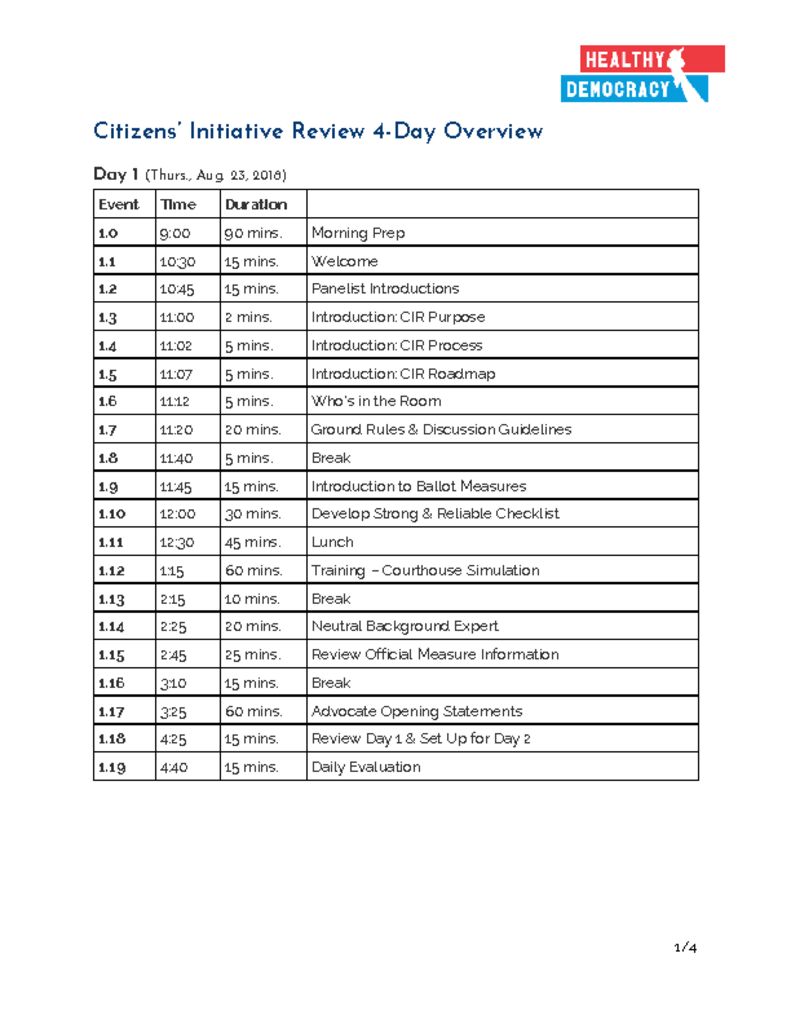The Portland metro area is hosting its first-ever Citizens’ Initiative Review (CIR), facilitated by Healthy Democracy, a nonpartisan, nonprofit based in Portland. Up for review: the Metro Region Affordable Housing Bond Measure. A cross-section of voters – who are randomly selected to match the demographics of the metro region in key areas such as political affiliation, race and ethnicity, age, gender, and education – will examine and deliberate on information related to the proposed measure and produce an informative statement for the benefit of their fellow voters.
The process began on July 13, when Healthy Democracy sent 5,000 randomly selected Portland-area voters a letter, inviting them to be citizen panelists. Those who are randomly selected from among the responses received will participate on a panel of 20 everyday citizens. They will hear testimony from experts and from advocates for and against the ballot measure, and then identify the basic information all voters need to know. The results of their work will be published as a Citizens’ Statement and publicized through local print and broadcast media – as information for voters by voters.
Live Stream
UPDATE: The Portland metro area CIR was live streamed in its entirety, care of our partners at the University of Oregon. All four days of the CIR live stream were recorded and will be available soon on our YouTube page.
How to Get Involved
- Watch the live stream!
- Observe the Citizens’ Initiative Review in person – August 23-26 at the University of Oregon’s White Stag Block campus in downtown Portland (more details below). The event is free and open to the public.
- Follow us on social media or check our blog for updates on the CIR and how to be involved.
- Sign up for our email newsletter to receive occasional updates on our work. (Don’t worry – we’ll never email more than once a month.)
More Details
| What: | A citizen panel will spend four days reviewing a 2018 Portland metro area ballot measure, as part of the Portland area’s first ever Citizens’ Initiative Review |
| Who: | 20 citizen panelists, plus a professional moderating team, support staff, and any member of the public who wishes to observe the process |
| When: | August 23 – 26, 2018 9:30am – 5:30pm (first day) 8:30am – 5:30pm (every other day) Detailed schedule forthcoming |
| Where: | University of Oregon’s George S. Turnbull Portland Center 70 NW Couch Street, Floor 3R Portland, OR 97209 |
Schedule
For a minute-by-minute view of the CIR process, see the PDF below.
 |
2018 CIR 4-Day Overview |
Frequently Asked Questions
What Is the Citizens’ Initiative Review?
The Citizens’ Initiative Review (CIR) is a four-day process where a randomized and representative group of everyday citizens evaluates information related to a ballot measure. This group (called the citizen panel) questions advocates for each side, as well as independent experts. The panel then reviews the information they have collected, identifies the strongest and most reliable facts, and drafts a Citizens’ Statement on the measure – the most important information they feel all voters need to know. On the final day of the CIR, we hold a press conference to publicize the Citizens’ Statement. The CIR is typically well-covered by print, broadcast, and online media.
Importantly, the panel never debates the ballot measure itself nor takes a position for or against it. The panel’s only goal is to provide voters with good quality information about the measure.
Who Will Conduct This CIR?
The 2018 Portland-area CIR will be conducted by Healthy Democracy, with assistance from the University of Oregon School of Journalism and Communications, the National Policy Consensus Center at Portland State University, and other partners.
Who Is Healthy Democracy?
Healthy Democracy is a strictly nonpartisan 501(c)3 nonprofit organization that has managed statewide Citizens’ Initiative Reviews in Oregon since 2008. In 2011, the Oregon legislature established the CIR as an official part of the state’s election process. We have also co-managed CIRs in Arizona, Colorado, and Massachusetts. In addition, we coordinate an urban-rural exchange program across the state of Oregon and design deliberation-based high school civics curriculum. For more information on Healthy Democracy and the CIR, click here.
What Ballot Measure Is Being Reviewed This Year?
The 2018 Portland-area CIR panel will review the Metro Affordable Housing Bond Referral, a measure being referred to voters by the Metro Council.
Who Received the Invitation to Participate? Who Is Selected for the Citizen Panel?
Names were selected at random from a list of all registered voters within the Metro regional government district, which covers portions of Clackamas, Multnomah, and Washington Counties. Citizen panelists were selected from respondents to this mailing. This selection process is random and anonymous, but it is also designed to create a panel that is a representative cross-section of all the registered voters in the Portland metro region. To do this, we ask the demographic questions of respondents; we then compare this info with data from the US Census and the Secretary of State’s voter rolls. (More on this process below.)
When Were Citizen Panelists Selected?
On Thursday, August 2 from 1 to 2 p.m. at the Central Library’s US Bank Room in downtown Portland, we’ll host the CIR Panel Selection Process as a free, public event. We’ll introduce the CIR, host a brief panel discussion with several former CIR panelists, and publicly conduct the randomized selection process for the 20 citizen panelists. (More details here.)
What Do Panelists Receive?
- A $500 stipend, paid at the conclusion of their four days as a CIR panelist
- Continental breakfasts and catered lunches each day
- Reimbursement for childcare expenses during their four days of service, if needed
- Transit passes or travel reimbursement at the federal mileage rate ($0.55/mile) & parking
- Lodging nearby if their commute to the venue would be more than one hour each way
How Is the CIR Similar to a Jury?
If it seems like the CIR has similarities to a traditional courtroom jury, you’re right. In fact, the CIR is based on a process called the “citizens’ jury,” which is used around the world to involve randomized, representative groups of everyday citizens in evaluating public policy. Like a traditional jury, we randomly select members of the public for civic service. And, like a jury, we ask that panelists not speak to family, friends, or the media about the issue at hand until after the CIR is completed. After the CIR, panelists may choose to speak publicly about their experience if they wish, but are never required to.
How Is the CIR Different from a Jury?
The CIR is unlike a traditional jury, however, in several key ways. First, panelists are selected in a randomized and anonymous process – but one that also results in a panel that is demographically representative of the general voting population. Second, there is no judge. The CIR is facilitated by a team of professional moderators, whose only job is to ensure the process runs smoothly. Citizen panelists are the final decision makers regarding the content of the statement, right down to correcting typos.
Finally, the panel’s deliberations occur as part of a four-day public meeting; there are no closed-door sessions. There is public seating at the back of the room where anyone is welcome to observe the process as it happens.
What Do Former Citizen Panelists Say About Their Experience?
Here are a couple quotes:
“I was able to review material the common voter would not have access to, and thus able to help them objectively in their voting process.”
“This opportunity to work side by side with fellow voters has affirmed my belief in the value of public participation in the democratic process.”
See more quotes here.
How Do You Ensure the CIR Process Remains Unbiased?
Although we recognize that bias is a natural human condition, we strive for a process that ensures as unbiased a forum as possible. The four days of the CIR follow a tightly scripted and thoroughly researched format, and the moderators who manage it are specifically trained to remain neutral to all content the panel discusses.
How Are CIR Citizen Panelists Selected?
The CIR uses a method for selecting participants that aims to create a panel of everyday citizens that is a random and representative sample of the larger population. We believe this ensures voters get the information they most need to know, from fellow voters they can trust.
First, we randomly select 5,000 names from among all voters within the Metro boundary – taken from the Secretary of State’s voter rolls. Then, after we receive responses, we anonymize all personal data, hold a public meeting, and ask an independent organization to select the panelists. Again, this selection is a randomized process, although one that also results in a demographically representative group of voters. We anonymize all demographic data, then commission an independent panel to select a panel that matches pre-calculated demographic targets, using continued random selection wherever possible.
What Makes a Citizen Panel Representative of Metro-Area Voters?
To ensure the panel is an accurate cross-section of all voters, the proportion of panelists will be the same as the region’s voting population in terms of age, gender, race, ethnicity, educational attainment, renter/homeowner status, location of residence, and political party affiliation.
Who Is Funding the 2018 Portland-Area CIR?
Funding for the CIR comes from a combination of donations from individuals and grants from regional foundations. We never take money from political interest groups or any organization likely to have a stake in the outcome of any ballot measure we review. For a list of our major donors, click here. In the future, we hope the CIR will be publicly funded as a standard part of state and county election procedure. Currently, however, we depend primarily on donations from voters like you.
If I Received the Mailing and Reply, Will My Response Be Truly Confidential?
In general, yes. However, the Citizens’ Initiative Review is a public meeting. Those who reply and are selected as panelists may have their first name, last initial, and city of residence publicly known to anyone who attends the meeting or watches via livestream. All other information, including panelists’ last name, contact info, and demographic info will remain private forever. Unless panelists give specific written consent, we will not provide their information to the press or anyone else. Ever.
How Else Can I Be Involved, Again?
We’re so glad you asked! We will live stream all four days of the CIR, and, like all members of the public, you are welcome to visit the CIR in person as an observer. Check our Facebook, Twitter, and Instagram feeds or our blog for more information as the CIR process moves forward.
What If I Have Other Questions?
Please don’t hesitate to email us at info@healthydemocracy.org or call 503-841-6865. We look forward to hearing from you!

